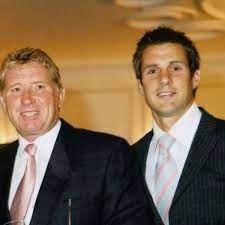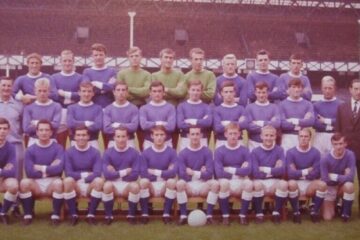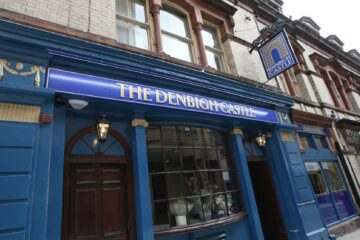‘Who is the greatest of them all?
Little, curly Alan Ball.’
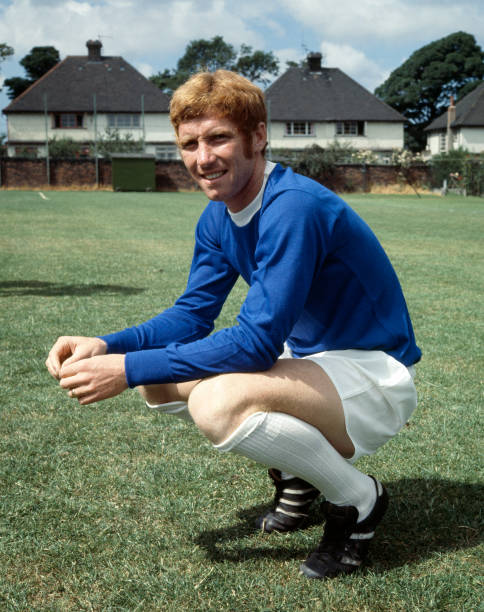
I’m sure that sounds familiar to a majority of Evertonians who were present at the Old Lady from 1966 onwards. Personally speaking, I think I was smitten with Alan Ball before I fell head over heels in love with Everton. Bally was a footballing God to many, even making it very difficult to separate him from another hero of Goodison – Alex Young, the Golden Vision himself. Fans will always talk about the ‘Holy Trinity’ – the trio composed of Kendall, Harvey and Ball, of course, who were the midfield engine which drove the team forward to a league championship in 1969/70, the club’s seventh and a new record at the time.
Bally’s performances for the Tangerines of Blackpool would become eye-catching at least to one man – Everton manager Harry Catterick – and Ball was soon to become one of his greatest ever signings. Ball’s game that afternoon (incidentally the day that Joe Royle made his Everton debut in January 1966) was dynamic. I’m led to believe that Catterick’s intention of getting the flame-haired youngster were confirmed that very day at Bloomfield Road as he caught the eagle eye of the Everton boss with a typically competitive performance.
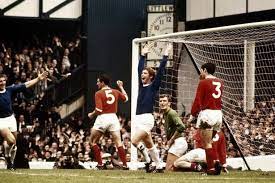
Bally’s man-of-the-match display six months later in England’s greatest hour when the national team won the World Cup at the end of July was the last piece of evidence, if any more was even needed, for John Moores, Everton’s chairman at the time, to sanction the deal. Ball signed for Everton that summer, a record signing at the time, ensuring he made his debut at Fulham on the opening day of the 1966/67 season along with another World Cup winner Ray Wilson in the ranks. Ball, of course, scored the winning goal at Craven Cottage that afternoon, the first of many in a royal blue shirt and a love affair with Everton and Evertonians was underway.

In Ball’s time at Goodison, Everton were runners-up in the 1968 FA Cup Final, League Champions in 1969/70 and Charity Shield winners months later. Everton also made the quarter final stages of the European Cup only to be harshly eliminated on the away goals rule by the Greek side, Panathinaikos. Further heartbreak was suffered days later by the defeat to neighbours and arch-rivals Liverpool in an FA Cup semi-final at Old Trafford after Ball had put the Blues in front, only to agonisingly concede two second-half goals to exit the competition. He will also always be remembered for having scored the winning goal in the 5th round FA Cup tie, when Everton beat the enemy from across the park, which was witnessed by well over 100,000 people combined at Goodison and via the live screening at Anfield.
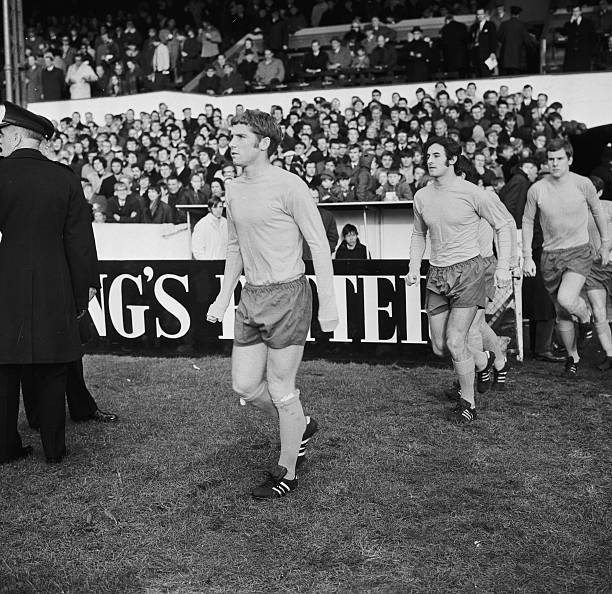
The British transfer record was broken for a second time when Ball was signed by north London club, Arsenal, in December 1971, in a move that stunned his fans on Merseyside. A string of other moves after his Highbury days led him into his first taste of management, becoming player-manager of Blackpool at Bloomfield Road in February 1980, where his career had begun – a role which ended sooner than expected.
Three years later, Alan was back in management on the south coast at Fratton Park, Portsmouth. Promotion to the First Division in 1987 again ended on a sour note as Pompey were relegated after one spell in the top flight. Stoke, Exeter City, Southampton, Manchester City and Portsmouth for a second time were also added to his management CV before he called it a day in 1999.
…………………………….
I often wondered what it would have been like to have been the son of a legend, a winner, a World Cup winner too, albeit not whilst at Everton. I spoke with Alan Ball’s son Jimmy to find out what it was like to grow up and follow in his footsteps into the game that was a major part of their lives.
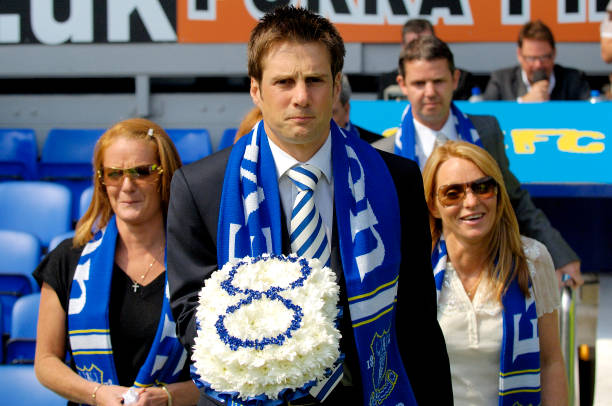
My introduction to football was from day one. I was always around it, surrounded by football people who were talking about football and I would take in the conversations revolving around the game. Subconsciously, I would say it all started from birth.
But I went into football of my own volition. Dad never once pushed me into it. I was trying to make the breakthrough as a player but, unfortunately, I wasn’t good enough. I did think that things were stacked against me as people would realise who I was, and after a couple of minutes their minds were made up by making unfair comparisons. At the time of growing up, I never thought about it and it never bothered me. Looking back as I’m a bit older, I actually think it did bother me as I was aware of the comments and what they meant.
As a kid, I recall my dad bringing back every piece of sports equipment he could get his hands on. We would play cricket in the back garden, there was a tennis racquet at hand, rugby balls and all sorts of stuff, so it wasn’t just about football.
Even when I was growing up and going to clubs – I went to Bournemouth and did some training with Jimmy Gabriel and different people other than Dad – he stayed away from it. He wanted me to be my own man so he left me alone. I had trials all over the south coast, spending short periods with Southampton, Portsmouth and Bournemouth. I eventually ended up at Exeter City, where Dad was, joining as an apprentice. But, once again, that was all down to me and not done as a favour from Dad. I went into Exeter City for a trial without Dad’s knowledge. Getting an apprenticeship at St. James Park meant more to me as I did it on my own. I wasn’t good enough to make the first team, sadly.
I was a half-decent, young player. I was very committed and ran around everywhere as I had a good engine. I would kick people, too! As I found out, there are levels in football and, if I’m being honest, I probably didn’t have enough quality, or my feet weren’t quick enough. I read the game well and could organise, but technically, I was not good enough. If you were to progress through the levels, you had to do be able to do the technical side of it.
I think at that point I realised I was never going to make it as a footballer so I left Exeter. At this point, Dad was managing at Southampton. I went there to train with them and did ok. As time progressed, I found myself clinging on, if that makes sense? I was really stretched every day realising once more that there were levels, and the level I was aiming for was way above me. It was an easy decision for me to accept that I wasn’t going to make it, knowing when you’re stretched and when you’re out of your comfort zone. I could cope with the tactical side, the understanding, the football and physical side of it. It was just my feet – they weren’t quick enough to do what was required at that level.
When I realised that I was no longer going to make it as a player, and as I’ve said, I’ve always been good at understanding the game, and still having the love for the game, I knew that if I couldn’t play, the next best thing for me was to coach. I took a bit of time to figure what it was I wanted to do. I was on a brief holiday in Vancouver where I bumped in to Ted MacDougall (ex-Bournemouth player) who had a soccer school out there. I went along, did a bit of coaching and, from that minute on, I have never looked back! It was great to teach young kids to understand and play the game, advising them with the knowledge that I had.
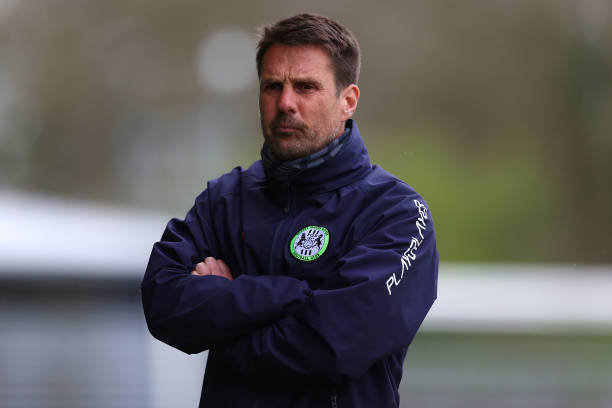
I was encouraged to do my coaching badges and would go elsewhere to coach. I have now been coaching for 25 years. I have experienced the benefits of the role, having been in lots of different countries with many different coaches and people. I am an ‘A’ licence coach and recently obtained a diploma in football management. I have had a spell as a coach at Portsmouth with Neil McNab where we brought through a very good crop of youngsters. The most notable would be Gary O’Neill. I spent six or seven years out in America having a great deal of success. I was at Stoke City for six years as a youth development coach, working with the under-13 and under-16 age groups at Stoke’s Clayton Wood training complex, revelling in the challenge of helping to turn the boys into men as well as footballers.
In August 2020, Jimmy, by then 45 years of age, left Stoke to join Forest Green Rovers as a professional development coach for players aged eighteen to twenty-three.
He left the club with mutual consent in September 2021 and was appointed first-team coach at League Two club Stevenage on 4 January 2022.
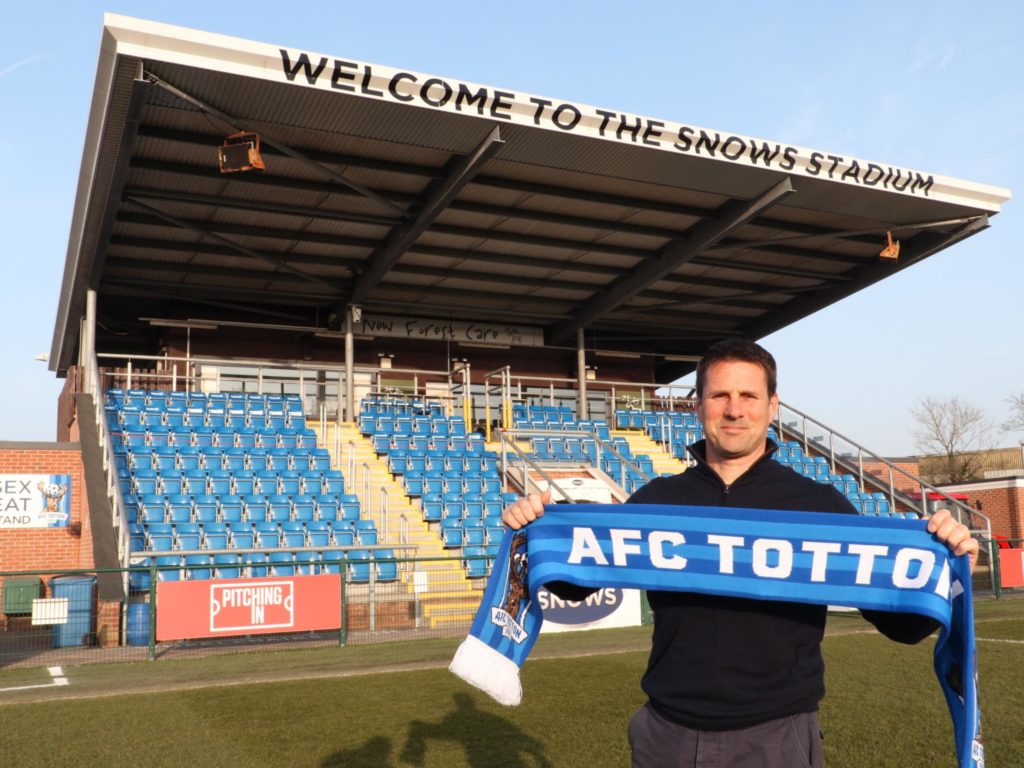
In March 2022, Ball was appointed as manager of Southern League side AFC Totten.

